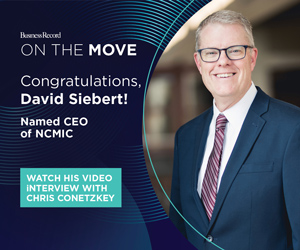More executives footing the bill for exclusive club memberships

The days of making business deals on the golf course followed by celebratory drinks in the clubhouse have not gone by the wayside, but more executives are finding themselves footing the bill when it comes to pricey memberships to some of Des Moines’ top private clubs.
“Today, it’s a much tougher sell to get people interested in corporate memberships,” said Three Carpenter, club manager at the Wakonda Club.
A change in the laws governing tax deductions in the early 1990s as well as uncertainties in the economy have induced many companies to discontinue their practice of offering memberships to their top executives, despite the appeal of entertaining clients at these locations.
Todd Kirk, a Des Moines-area sales manager for pharmaceuticals giant Schering-Plough Corp., made the decision to pay for his own membership to Wakonda when he joined two years ago. Though his reasons for becoming a member were primarily personal, he has put the club’s facilities to good use professionally as well, hosting meetings, speakers, golf outings and other events.
“It’s phenomenal food, the help is great and outsiders see it as a great place to go,” Kirk said. “It’s a little more exclusive, more of a draw.”
Private clubs have been seeing more members such as Kirk – executives willing to pay an initiation fee, monthly dues and other costs when their employer does not offer a club membership benefit.
“I think that’s still happening, but more and more it’s on the member’s bill,” said Jim Cutter, general manager and chief operating officer of the Des Moines Golf and Country Club. The club does not offer corporate memberships but it frequently hires out its banquet facilities to companies for business-related events.
Up until the early 1990s, club memberships were tax-deductible for businesses, like employee benefits. But a change in tax laws eliminated the deductibility, leading many companies to discontinue paying for club memberships for their top executives.
“I think the change in policy was due to the fact that [the government was] looking for revenue and they probably saw that as something they could take away without hurting many people,” said Margaret Van Houten, an attorney with Pearson Van Houten PLC in West Des Moines, whose practice areas include taxation and employee benefits. “I’m sure it was just a revenue-raising issue.”
Van Houten said eliminating deductibility had the potential to increase federal tax revenues due to the extremely high cost of private club memberships, particularly in other parts of the country.
“You found all these people were joining because it was a perk,” Carpenter said. “But clubs found that members were resigning because they could no longer afford to pay for it themselves.”
At Echo Valley Country Club, club manager Ron Rand said only a handful of area companies have corporate memberships, despite incentive offers based on the initiation fee. To take advantage of corporate memberships, companies must have at least two employees become members, although membership always hinges upon the club’s membership availability.
“The corporation has the right to designate the members, so that’s a pretty good perk for them, too,” Rand said.
He said companies typically cover the employee’s initiation fee and monthly dues, while the individual member is responsible for itemized expenses, some of which are reimbursed by the employer as a business-related expense.
Wakonda’s small number of corporate-sponsored members have the option of a full golf membership or a dining-only membership with a “transferability feature” that Carpenter said allows companies to transfer memberships for a small fee when an executive leaves the company.
Carpenter said companies rationalize paying top dollar for their executives’ club memberships because of the belief that “I want you taken care of and I want you taking care of clients.”
“You’re seeing people doing a lot of entertaining because it’s a nice, quiet environment where they’re taken care of and it’s not horrifically busy,” he said.
Carpenter said golf course business deals are hardly a thing of the past, either, primarily due to the relaxed environment.
“A normal meeting lasts 30 to 45 minutes,” he said. “But when you’re playing golf, they’re stuck with you for four or five hours. That’s a lot of stuff getting done over that period of time.”
In some instances, Kirk has offered a golf outing as part of his rewards program for sales representatives and has brought nationally known speakers to Wakonda for doctors’ programs. On Sunday night, Kirk hosted a dinner at the club for a group of Schering-Plough sales representatives from Iowa, Nebraska and Illinois. He said planning that type of event at the club, regardless of size, is fairly easy as the Wakonda staff does most of the legwork is taken care of by the staff.
“It’s just a matter of nailing down how many people we have,” he said. “Other than that, it’s pretty easy.”
Kirk is reimbursed for his business-related expenses at Wakonda by Schering-Plough, tapping into the company’s various budgets. Van Houten said that, despite the change in the deductibility of club membership benefits, business meals remain 50 percent tax-deductible.
“It doesn’t hurt the employee who is doing the entertaining at all,” she said.
Becky Stadlman, senior human resources consultant for Ames-based Sauer-Danfoss Inc. and president of the Central Iowa chapter of the Society for Human Resource Management, said club memberships provide executives with an opportunity for business networking.
“There’s kind of an aura of being exclusive with a club membership,” Stadlman said.
But she said financial concerns have become more of an issue for corporations, which, combined with the tax status of memberships, have made corporate-sponsored memberships increasingly rare.
“If you’re a company and cost is a major concern, that’s probably one of the first things you want to take a look at,” she said.







